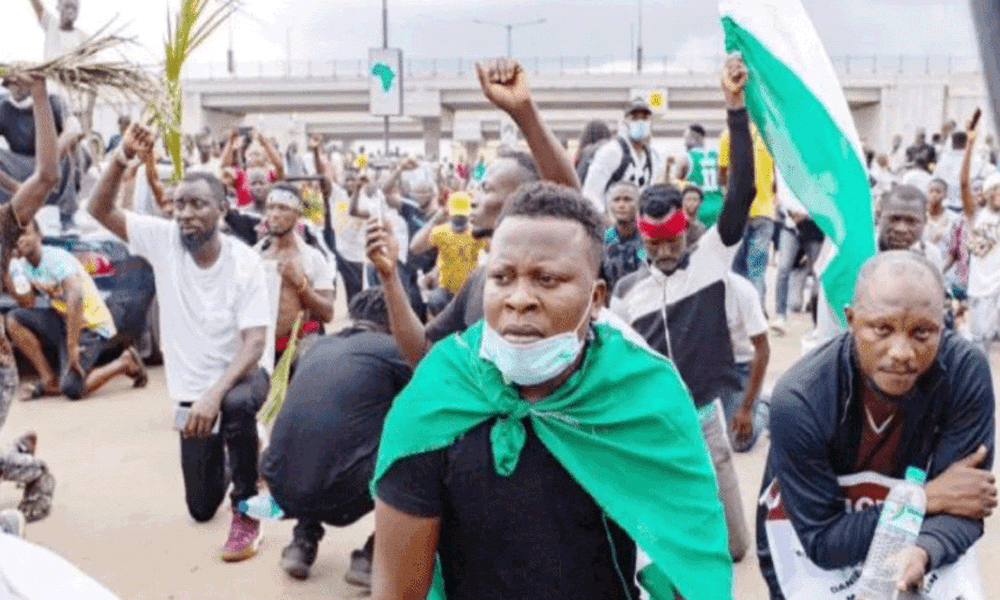#ENDBADGOVERNANCE PROTEST: Tension Mounts As FG, Security Agencies, Others React

…US, UK, Canada Issue Security Alerts
…Traders, Commuters Fear looting, Attacks
…IGP Directs DIGs, AIGs, CPs To Protect Protesters
As Nigerians await the planned nationwide protest against poor governance in the country, on Thursday, August 1, 2024, there are growing tensions across the country between supporters and opponents of the action it will hold or not.
The protest, which has gained significant attention and support from various individuals and civil society organizations, aims to bring attention to the country’s deteriorating economic situation and demand accountability from the government.
However, government officials and agencies have expressed strong opposition to the protest, warning citizens against participating in what they describe as an “illegal gathering.” Despite this, the Inspector-General of Police, Koyode Egbetokun, has ordered senior police officials to provide protection for protesters, citing their fundamental right to freedom of expression.
The IGP’s directive has been seen as a significant development, as it suggests that the police force may not crack down on protesters as initially feared.
In a statement, the IGP emphasized the importance of allowing citizens to exercise their rights peacefully, while also warning against any form of violence or destruction of property.
Protest organizers have welcomed the IGP’s directive, describing it as a victory for democracy and the rule of law. They have assured participants that the protest will be peaceful and orderly, with marshals deployed to ensure that everyone adheres to the agreed-upon route and timeline.
Despite the IGP’s assurance, some government officials have continued to speak out against the protest, describing it as a “threat to national security.” They have urged citizens to shun the demonstration and instead engage with the government through “official channels.”
Civil society organizations have countered this narrative, arguing that the government has failed to address the pressing issues facing the country, leaving citizens with no choice but to take to the streets. They have accused the government of trying to stifle dissenting voices and silence critics.
Meanwhile, the Rivers State Commissioner of Police, Tunji Disu, has advised residents and stakeholders on appropriate conduct during the upcoming August 1 protest. This advice was given during a town hall meeting held on Monday, where Disu addressed various stakeholders, including traditional rulers, community leaders, and representatives from the NUJ, NLC, TUC, IPAC, political parties, NGOs, youth bodies, and student unions.
The Rivers Police boss emphasized the police’s commitment to protecting lives and properties and urged residents not to attack any groups participating in the protest. He assured the public that the police would maintain peace and order throughout the protest period, which is scheduled to run from August 1 to August 10.
These announcement of the protest has sparked divided opinions across Nigeria, with economic hardships fueling debates and tensions among leaders and citizens. Despite the unrest, many stakeholders in Rivers State have declared that their groups will not be participating in the protest.
The Chairman of the Rivers State Traditional Rulers Council, His Majesty Eze Chike Worlu Wodo, Paramount Ruler of Apara Kingdom in Obio/Akpor LGA, stated that Rivers State indigenes would not join the protest. Similarly, representatives of the Igbo, Yoruba, and Hausa communities in Rivers State affirmed that their people would refrain from protesting.
Stakeholders also praised Commissioner Disu for his efforts in combating crime and urged him to continue his commendable work in maintaining security in the state.
As the protest approaches, tensions remain high, with many wondering how events will unfold. Will the government’s efforts to discourage participation succeed, or will Nigerians turn out in large numbers to demand change?
The international community is also watching closely, with some organizations expressing concern about the potential for violence and human rights abuses. They have called on the government to respect citizens’ rights and engage in meaningful dialogue to address their grievances.
In the meantime, residents are bracing themselves for the potential impact of the protest on daily life. There are speculations that some businesses have announced plans to close temporarily, while others are advising employees to work from home. As the nation holds its breath, one thing is clear: the hunger protest has brought to the fore the deep-seated frustrations and aspirations of Nigerians, and its outcome will have significant implications for the country’s future.




